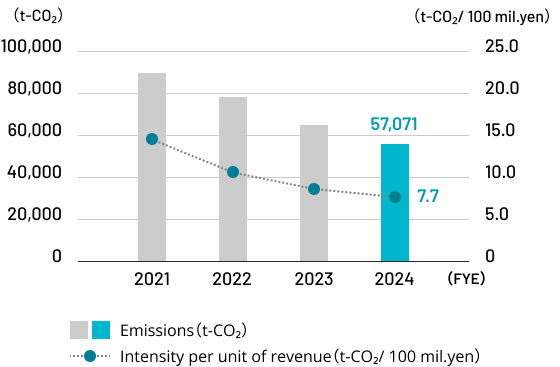Responding to Climate Change
Contributions to Decarbonization
Toward the realization of decarbonization, we are developing products that contribute to solving environmental problems and promoting environmentally friendly business activities. In addition, we have set reduction targets for greenhouse gas (GHG) emissions reduction.
GHG Emissions(Scope1,2,3)
-
Scope1
(0.5%)
-
Scope2
(0.9%)
-
Scope3
(98.6%)
-
Category1
(32.2%)
-
Category4
(9.0%)
-
Category11
(54.9%)
-
Category2,3,5,6,7,12
(2.5%)
-
3.99million t-CO₂
(FYE2024)- Of the 15 categories in Scope 3, categories 8, 9, 10, 13, 14, and 15 have been excluded from calculation.
The figures in parentheses above are percentages of the total of Scope 1 through 3, with 3.99 million t-CO2 as the denominator.
Initiatives in Our Business Activities
To reduce GHG emissions in our business activities, we are actively utilizing renewable energy and conserving energy where possible. In addition, to raise environmental awareness among employees, we conduct educational activities, including distributing energy-saving promotional materials to employees and making regular inspections to check energy-saving responses undertaken at offices and plants.
In FYE2024, greenhouse gas emissions (Scopes 1, 2) decreased by 12.9% from the previous fiscal year to 57,071 t-CO2.
Greenhouse Gas Emissions(Scopes1,2)

Utilization of renewable energy
We are working to reduce GHG emissions through such measures as installing photovoltaic panels. In FYE 2024, photovoltaic panels were installed at our overseas location in Estonia. Photovoltaic panels were also installed in Japan at the shipping building at the Okazaki Plant as well as in the Head Office.
We plan to continue installing photovoltaic panels at our facilities in Japan and overseas and to switch to renewable energy sources for electricity used at our offices and other facilities. In FYE 2024, we introduced renewable energy at our sites in Chile and New Zealand. In addition to photovoltaic panels, some sites in Germany and other countries have installed geothermal heating and cooling systems and are working to reduce GHG emissions through the use of renewable energy.
Installed solar panels


Initiatives with Our Products

Since Makita brought to market the world’s first professional-use power tools employing lithium-ion batteries in 2005, we have been expanding our lineup of cordless products and, in recent years, actively replacing engine-powered products with cordless models, especially in OPE, where engine-power is mainstream.
Reflecting increased awareness of such environmental issues as climate change, the impact of exhaust from engine-powered tools has become a major issue.
Because Makita’s cordless OPE, which emits no exhaust gas during use, contributes significantly to the realization of decarbonization, we are focusing on this as our next pillar of business in addition to power tools. To further this goal, we terminated the production of engine-powered products.
We will continue to focus our management resources on the development, production, and sale of cordless products and accelerate the transition from engine-powered to cordless products with equivalent performance, thereby contributing to the realization of decarbonization.
Targets Related to GHG Emissions
The impact of climate change on society, such as frequent wind and flood disasters, is becoming more serious, and companies are playing an increasingly important role in realizing a decarbonized society. Our company views climate change as an important business issue.
For this reason, our company has prioritized contributing to the solution of climate change issues by, for example, focusing on cordless OPE that does not emit exhaust gas when used. However, in order to further accelerate these efforts, we have newly set targets for reducing GHG emissions. The Makita Group has set goals to reduce GHG emissions from its own business activities (Scopes 1, 2) to virtually zero by FYE 2041 and from its entire supply chain (Scope 3) to virtually zero by FYE 2051. The mid-term target for Scopes 1 and 2 is to halve the FYE 2021 level by FYE 2031.
Initiatives for the TCFD Recommendations

In addition, recognizing the importance of dialogue with stakeholders on climate-related risks and opportunities, we disclose information based on the recommendations of the Task Force on Climate-related Financial Disclosures (TCFD). See here for more information.
SustainabilityEnvironmental Initiatives (E)
